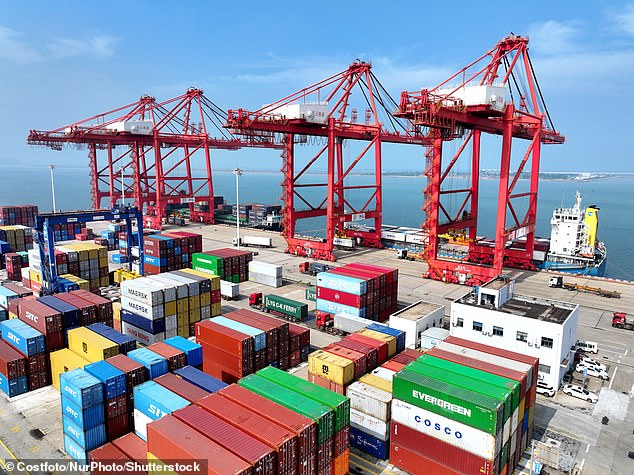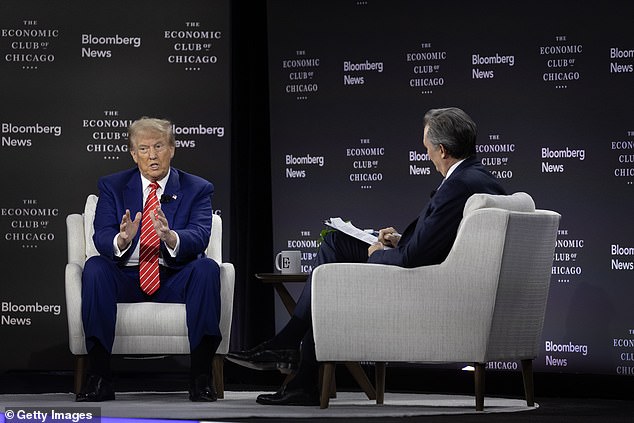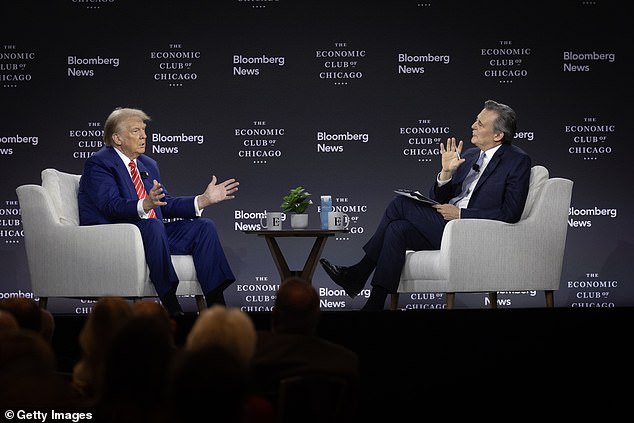Donald Trump clashed with his interviewer during a series of tense exchanges over his plan for big tariffs and other policies in the Chicago Economic Club.
Trump, who sometimes answers questions from what he calls “fake news” media but often sits down with friendly interviewers, was asked repeatedly on Tuesday about his plan to impose tariffs of up to 100 percent on products imported.
“To me, the most beautiful word in the English language is tariff,” Trump said. And it’s my favorite word. You need a public relations firm,” he said, early recognizing the disputes that would follow.
“I know you’re an anti-tariff guy,” Trump told his interlocutor, John Micklethwait, editor in chief of Bloomberg News.
“You could be sinking the United States into the biggest trade war,” Micklethwait told him. “Trade with China will basically stop… That will have a serious effect on the overall economy… The overall effect could be massive.”
Trump responded: “I agree.” “It’s going to have a huge effect, a positive effect.”
Former President Donald Trump exchanged views with interviewer John Micklethwait about the proposed tariffs.
The exchange made Trump ready to attack his interlocutor, a former British editor of the Economist who attempted to confront him with the anticipated effects of his plans.
“It must be hard for you to spend 25 years talking about tariffs as negative and then have someone explain to you that you are totally wrong,” Trump told him.
He said tariffs could be made “so high, so horrible, so nasty” that companies would come and invest “immediately.”
Micklethwait responded that there were 40 million American jobs “that depend on trade,” and then tried to point out that American consumers can bear the brunt of tariffs through higher prices.
“Critics say your tariffs will end up being like a national sales tax” on consumers, Micklethwait told him. “No,” Trump responded.
Micklethwait then asked him about the math. —Not as you thought. “I was always very good at math,” Trump told him.
In the wide-ranging discussion there were moments when Trump went on to talk about North Korea, South Korea and former German Chancellor Angela Merkel. But it was his interviewer, not the crowd, who was put off by the tangents.
Trump had an answer for these errant responses. ‘I call it the weaving. You have the fabric. As long as you end up in the red location at the end,” he said. He then said the nation has never been closer to World War III and its efforts to end ISIS.
After Trump went on to talk about how good the American military is, Micklethwait told him: “With great respect to you, I was asking about tariffs.

Trump threatens to impose tariffs of up to 100 percent, or even ‘20,000 percent’ to try to force companies to build factories in the United States.

Micklethwait said the tariffs would amount to a consumption tax on American consumers.
‘You have said that Taiwan should pay for our protection. Yes, I asked because this morning you just mentioned North Korea; the Chinese military is literally, as we speak, rehearsing a total naval blockade of Taiwan. So I guess my question is: If China invades Taiwan, would you send US troops to defend it? -Micklethwait asked.
‘Well, the reason they’re doing it now is because they won’t do it later. Well? So they’re doing it now,” Trump said.
The publisher also pressed Trump on a revelation in Bob Woodward’s new book that Trump had spoken to Russian President Vladimir Putin seven times since leaving office.
He asked Trump for a yes or no on whether he had spoken to Putin since he was no longer president.
‘“Well, I won’t comment on that, but I will tell you that if I did, it would be a smart thing to do,” Trump said.
Micklethwait also pressed Trump on his spending plans, alluding to an estimate by the Committee for a Responsible Federal Budget that it would be $7 trillion over a decade. “You’re racking up enormous debt,” he told Trump. He pointed to an even higher estimate of $15 trillion by the Wall Street Journal.
‘They have been wrong about everything. By the way, you too,” Trump responded.
“You were wrong.”
“You’re trying to turn this into a debate,” Micklethwait told him. “It’s not a debate: you’ve been wrong all your life on this matter.”
When Micklethwait tried to keep his answers on track, Trump tried again. ‘You can’t go that fast… I’m just telling you the basics: it’s called weaving. “It’s all these different things that happen.”
Trump also received applause when he criticized a “corrupt press.”
The two men also clashed on January 6, when Micklethwait told him that “it was by far the biggest, the worst transfer of power in a long time.”
“This is what they like to do,” Trump said when asked if he would accept a peaceful transfer of power.
‘I left the morning I was supposed to leave. “I went to Florida and you had a very peaceful move,” Trump said.
He also made reference to “strange things” at the Capitol that he did not specify when describing the Capitol riot. ‘And some people went to the Capitol and a lot of strange things happened there. “There’s a lot of strange things going on when police wave people into the Capitol,” he said.


